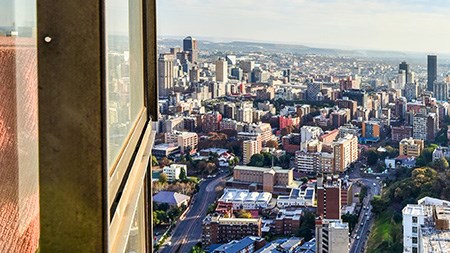Long Term Trends – where are we going, what is changing and what do we do?
Dr Dolf De Roos, author of Real Estate Riches and the first truly international property investor, says that the easiest way to get wealthy is to understand the trends, measure them and then just invest in real estate (property) where the trends are going in the right direction. Below is a synopsis of the major trends which effect property, creating wealth through property and where the future is going.
Trend 1 - Focus on income
- From the biggest property funds to the individual investors, the biggest lesson we have all learnt from the GFC (Global Financial Crisis), is that those people who focus on capital growth have disappeared or taken allot of pain, and those who focus on income are even stronger today. In a world where uncertainty is the only certainty, you need to do your analysis on the quality of the information you are being given, the partners you have who will make sure you collect the income and most importantly whether the investment works, purely on the income potential. However when someone asked Clem where to invest in property and deal with all the uncertainty he said, “The most important thing is who you partner with, who is going to manage your properties and what is your return on capital. Even outside of property, in his research of the Dow Jones and all the returns which have been made in the last 100 years on the stock exchange, 2/3 of all the wealth that has been made was in dividends and only 1/3 in capital gains. Therefore you need to establish the income and calculate the return on capital”
Trend 2 - Population growth
The most important thing in property is supply and demand. To ensure that demand is increasing for both rents and property demand (this will ensure sustainable growth) you need to have population growth. Two examples one is macro and the other is economic:
Japan – the population of Japan is decreasing from 120 million to 100 million and due to this when the property bubble in Japan crashed in 1989, it has never recovered.
USA – in 2004, 1 in 4 American homes built stood empty, which eventually led to an oversupply of 10 million homes, and this (along with wreckless lending and focus on capital growth) led in 2008 to the GFC and the property disaster in USA.
Therefore the focus areas based on population growth are USA, Australia, South America, Africa, the East (but not China as they have a 1 family policy), but mainly places like India. The problem areas are the UK, Europe or anywhere where the population is aging and in decline.
Trend 3 - Purchase price vs replacement value
- As they say in property, you make money when you buy, not when you sell. Therefore you need to focus on buying well and the best way to understand value of a property (after the income it can earn) is what the replacement value is. What would it cost to rebuild this property? In different countries this varies and it is the best way to determine the value or property and whether it is better to buy new property or existing property. In USA as an example you are buying property at 40% to 60% below replacement value and so it is my belief that over the next 5 years it is reasonable for property to increase by roughly 10% a year to ensure that it gets back in line with building costs. This has nothing to do with capital growth, nothing new can be built until these costs are back in equilibrium and especially if demand is outstripping supply, then it is only a matter of pent up demand will ensure that this takes place.
Trend 4 - What is the most important trend happening in property globally?
For many years people have wanted to invest close to where they live or certainly in the country they live. The age-old Afrikaans adage “ver van jou goed, na aan jou skade” (far from your possessions, close to your damage) has plenty of wisdom, but the world is changing. It is going global and technology allows you to invest in the sectors, countries and properties which will get you the best returns long term. Not only is it wise, it is prudent for investors to have global investments so that they are not exposed to one sector or even one country.
As Dr Dolf De Roos said, “Trend of investing overseas is going to accelerate and investors need to decide whether you are on the leading edge or the trailing edge of the curve.”
The bottom line is you that you only need to focus on 2 things to be successful – Information and Partners. You need the right information on the long term trends, the best areas, etc and you need the best partners to make sure you can maximise the opportunity. A very wise investor recently told me, “He would rather buy an average property with a great partner, than a great property with an average partner.”
Trend 5 - Scenario Planning – what we need to know about the future and what to do?
Clem Sunter is the International Leader (South African) in Scenario Planning. He has an excellent book called Mind of a Fox, where he explains the world has changed. In the 1990’s it was all about having a vision, one big idea and then making sure that everything and everyone was moving towards the one big vision. Now with all the uncertainty we have, it is far more wise to be nimble, to adapt and change as the environment changes. As Clem says, it is all about reviewing all the different scenarios which are possible and then have a plan for each scenario.
IPS has developed a scenario planning model which, based on Clem Sunter’s world renowned research and scenario planning, then mathematically shows you the which are the better options of what to invest in and where to invest, based on the various scenarios of what could happen globally and in South Africa.
Trend 6 - Where is the best place in the world to invest?
At the recent property and wealth summit held by Real Estate Investor Magazine, hosting the top international thought leaders of Dr Dolf De Roos, Clem Sunter and Robin Banks, one of the delegates asked where is the best place to invest in the world?
Dr Dolf De Roos said, “India and China have the best population growth in the world at the moment, and probably India will be the future of the global economy, but at the moment the best opportunity right now in the world is USA.”
Clem Sunter said, “USA is a much better investment than Europe, based on probability and price. London is expensive as the prices have not come down. Australia I would be concerned about China going into decline. You have to consider both - probability and price!”
The reason for this is that you are buying at 40% to 60% below replacement value and you can achieve rental yields of 10% to 20%, which is unbelievable for a first world country. Bottom line is that they have just come out of a catastrophe, property has lost 40% across the country and as the confidence comes back, the market has turned. With Warren Buffett, Wall Street, Donald Trump, Dr Dolf De Roos, the press and virtually anyone you speak to or anything you read, they all agree one thing – the market bottomed out at end of last year.
This is the greatest wealth transfer taking place in our life time, as the USA can’t get mortgages, are psychologically scared and until they wake up the opportunities in USA cannot be matched elsewhere in the first world.
Trend 7 - Collective Buying Power – how to buy the best properties in the world with minimal investment?
Kickstarter is one of the most exciting developments which have happened in 2012. Basically in the past, when a entrepreneur wants to launch a new concept they would have to go to a venture capital firm and try and raise $10 million (as an example) to get started. Kickstarter was started to help social enterprise and most importantly collective buying power and crowd sourcing. A recent company raised over $10 million dollars in less than 48 hours with the average investment per person of $20. It is no different to Groupon for restaurants – it is power to the masses with collective buying power.
Money from banks is very difficult to find, but with the advent of technology, business, projects and even property will now become assessable to the masses through collective buying power and this crowd sourcing.
Wealth Migrate has been launched to provide a global, self service, crowd sourced property solution, which takes advantage of local property markets, through best of breed partners and collective buying power. This will be optimised by a Global IT Platform, providing transparency and efficiency of property markets!



